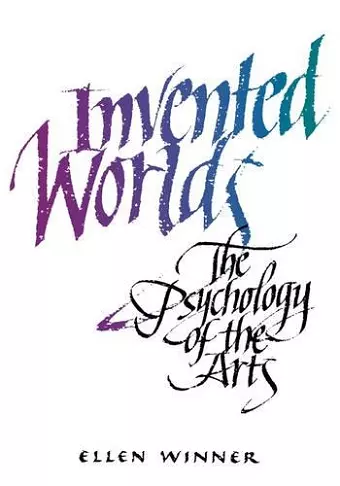Invented Worlds
The Psychology of the Arts
Format:Paperback
Publisher:Harvard University Press
Published:31st Jan '85
Currently unavailable, and unfortunately no date known when it will be back

This is the book to read for a provocative and comprehensive survey of the psychology of the arts. The division of Winner's theoretical sympathies, between Gestalt and constructivist viewpoints, males for an interesting tension and a questioning spirit throughout. -- Howard E. Gruber An excellent introduction to what psychologists have to say about "the puzzle of art," including studies which view the problem "from above" as well as "from below." The reader may pick and choose as his own personal preferences dictate. Since Fechner began the experimental study of aesthetics, a great deal has happened, and Ellen Winner is a safe guide to the large literature that has grown up since. There has not been a book summarizing all this work for many years, and the author is to be congratulated on having so successfully coped with a daunting task. -- H. J. Eysenck A balanced and lucid presentation of current theories and findings in the field of art and psychology. The book provides a coherent framework for the examination of central issues in the psychology of art and in addition to offering an "overview," it also successfully formulates problems that are amenable to empirical investigation...Its clear presentation will make it a favorite for the student of psychology and the arts. -- Claire Golomb
Psychologist Ellen Winner studies the creative, nonliteral discourse of children's spontaneous speech, examining how their abilities to use and interpret figurative language change as they grow older, and what such language shows us about the changing feature's of children's minds.
Cave paintings of our prehistoric ancestors, elaborate ritual dances of preliterate tribesmen, long lines at the movies, earnest scribbles of the three-year-old next door—evidence of human preoccupation with art is everywhere, and it is overwhelming. But unlike other human universals—language, tool use, the family—art makes no material contribution to mankind’s survival. What impels the artist to the lonely effort at self-expression? What moves the audience to resonate to the work of a master? What accounts for the child’s inherent fascination with pictures and stories and songs?
These questions are among the deepest we can ask about human nature. Freud deemed some of them forever unanswerable, but modern psychology has made new inroads into these old mysteries. Invented Worlds provides a complete, authoritative account of this progress. Dealing with the three major art forms—painting, music, and literature—Ellen Winner shows how the artist fashions a symbolic world that transforms the experience of the observer. She probes the adult’s ability to create and respond to works of art. In addition, she examines children’s art for what it can reveal about the artistic impulse before adult convention becomes a shaping force. Finally, in order to reach a better understanding of the biological bases of artistry, Winner discusses the art of the mentally disturbed and the neurologically impaired patient.
The sum of these discussions is more than an up-to-date handbook to the field; it is nothing less than a new synthesis of our understanding of man’s artistic nature. Written with admirable clarity, Invented Worlds is a book that can be used by professionals and students in psychology, education, and the arts, as well as anyone with reason to be curious about the processes that underlie the creation and enjoyment of art.
[T]here has not been such a book in years…[and] this book is extremely good. I would not be surprised if it became the standard text for courses on the psychology of art… Winner takes widely scattered studies and weaves them together very nicely, always keeping the theoretical issues clear. * Contemporary Psychology *
Knowledgeable, useful, and up-to-date… This is the most refreshingly readable book in psychology I have come across in a very long time. * Journal of Aesthetics and Art Criticism *
Ellen Winner draws together a vast array of research on creativity… The interested reader will find here an encyclopedia of issues in the field and an analysis of what is still unknown. * Psychology Today *
Ellen Winner’s handsomely printed Invented Worlds does us all a tremendous favor by combining the two hitherto separate fields of the psychology and the developmental psychology of the arts in a general descriptive accounting. * Studies in Visual Communication *
An excellent introduction to what psychologists have to say about ‘the puzzle of art,’ including studies which view the problem ‘from above’ as well as ‘from below.’ The reader may pick and choose as his own personal preferences dictate. Since Fechner began the experimental study of aesthetics, a great deal has happened, and Ellen Winner is a safe guide to the large literature that has grown up since. There has not been a book summarizing all this work for many years, and the author is to be congratulated on having so successfully coped with a daunting task. -- H. J. Eysenck
A balanced and lucid presentation of current theories and findings in the field of art and psychology. The book provides a coherent framework for the examination of central issues in the psychology of art and in addition to offering an ‘overview,’ it also successfully formulates problems that are amenable to empirical investigation… Its clear presentation will make it a favorite for the student of psychology and the arts. -- Claire Golomb
This is the book to read for a provocative and comprehensive survey of the psychology of the arts. The division of Winner’s theoretical sympathies, between Gestalt and constructivist viewpoints, males for an interesting tension and a questioning spirit throughout. -- Howard E. Gruber
ISBN: 9780674463615
Dimensions: unknown
Weight: 844g
448 pages